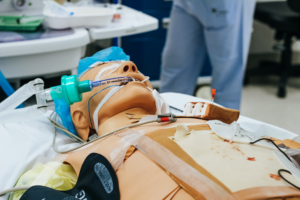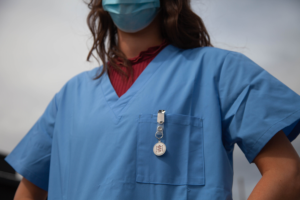
MSN Programs in Kansas
By EveryNurse Staff on January 15, 2023

Nurses who wish to become a certified nurse-midwife working with expectant mothers and newborns will need to complete an MSN program in order to obtain the advanced degree required to hold the title. Getting a Master of Science in Nursing in Kansas is just one of the ways that a healthcare professional can not only work with pregnancy-related cases, but also qualify for an advanced practice nursing job, leadership role, or a position in nursing education.
Schools With MSN Programs in Kansas
- Offering both on-campus and online courses, Fort Hays State University is home to a Master of Science in Nursing program for the aspiring family nurse practitioner, nurse educator, or nurse administrator. The Nursing Administration (NA) track focuses on administrative management within health organizations and complex organizations, while the Nursing Education (NE) track concentrates on curriculum planning and evaluation, as well as teaching strategies. Those with an interest in the Family Nurse Practitioner track will encounter advanced didactic and practicum courses. It is important to note that the school requires two applications as well as the fulfillment of other requirements before a nurse can be admitted into any of the FHSU Department of Nursing programs.
- Those who attend MidAmerica Nazarene University may pursue an MSN in Healthcare Administration, Nursing Education, Healthcare Quality Management, or Public Health (with an emphasis in School Nursing, Infectious Disease Control or Occupational Health). With a curriculum designed for licensed registered nurses possessing a BSN degree, the school offers both online and on-campus learning opportunities. Courses take on the format of 8-week modules for part-time and full-time study. In addition to online instruction, students may take courses at the school’s Olathe, Liberty or North Kansas City locations, which offer start dates in January, August, and October.
- Newman University, located in Wichita, grants a Master of Science in Nurse Anesthesia (MSNA) to baccalaureate-prepared registered nurses looking to assume an advanced practice role. In the classroom, students will learn about anatomy, physiology, pathophysiology, biochemistry, chemistry, physics, and pharmacology as these subjects relate to anesthesia. The program includes about 50 hours per week in the classroom and clinical area during the 24-month program. The Newman University Nurse Anesthesia Program also boasts a pass rate for the CRNA Certifying exam of 96 percent, which is well over the COA requirement of 85 percent, as well as the average national pass rate of 91 percent.
- The Master of Science in Nursing Program at Pittsburg State University caters to nurses interested in Family Health, and especially prepares a nurse to address the health care needs of patients living in rural southeast Kansas and the region. Graduates are eligible for national certification examinations, as well as to apply to the Kansas State Board of Nursing for Advanced Registered Nurse Practitioner (APRN) status upon completion of their degree. Depending on a nurse’s chosen track, he or she will receive the designation of either Family Clinical Nurse Specialist or as a Family Nurse Practitioner.
- Students attending the University of Kansas Medical Center (located in Kansas City) will find an MSN program curriculum that incorporates the following cores: Common (provides core knowledge and skills related to any advanced area of nursing), Leadership (focuses on the theoretical basis for the leadership specialty areas), Research (teaches nurses how to understand and use research), and Functional Specialty (delivers necessary information related to the advance practice specializations of Clinical Research Management, Nursing Informatics, Organizational Leadership, or Public Health Nursing).
- The School of Nursing at Washburn University in Topeka offers three tracks in the school’s CCNE-accredited MSN program: Adult Nurse Practitioner, Family Nurse Practitioner, and Clinical Nurse Leader. The requirements for a nurse to enter the MSN program at the University include completing a BSN degree program with a 3.0 GPA in nursing coursework; the completion of a graduate inferential statistics course; and current licensure in the state of Kansas.
- The School of Nursing at Wichita State University offers two concentrations of study within its accredited MSN program: Nursing Education (Direct Care) and Nursing Leadership and Administration. The education track requires the completion of a minimum of 37 credit hours. Some of the core classes that a nurse pursuing this degree will encounter include Applied Drug Therapy, Foundations of Nursing Education, and Teaching Strategies for Nursing Education. The leadership and administration track is comprised of a minimum of 36 credit hours of course work, and includes core classes, such as Nursing and Health Care Systems Administration Practicum, Leadership & Emerging Issues in Nursing, and Health Care Policy and Administration.
Kansas MSN Checklist
- Become licensed in Kansas as a Registered Nurse (RN).
- Apply to an accredited MSN degree program, and fulfill program requirements, such as completing supervised clinical experience hours, when applicable.
- Apply for licensure with the Kansas Board of Nursing (~ $75 fee); fees will vary if a nurse possesses a temporary permit. The Board also requires applicants to submit a certified copy of any court documents that explain any past law convictions with their application.
- Provide a copy of current specialty certification by an approved National Certification organization.
- Pass the National Council Licensure Examination (NCLEX) for Kansas.
Kansas MSN Salary & Job Outlook
An MSN degree is one of the things that a nurse can obtain in order to earn a higher salary when applying for jobs. According to the U.S. Bureau of Labor Statistics, healthcare professionals stand to earn median salaries for the following MSN-degree related careers in Kansas: medical and health service managers ($85,680), nursing instructors and teachers ($58,860), and nurse practitioners ($80,720).




